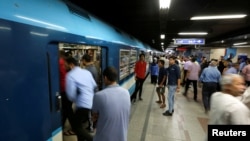Egyptian police arrested 21 people for taking part in rare protests against the government's surprise decision to hike fares on Cairo's subway as part of austerity measures meant to overhaul the economy, officials said Saturday.
The arrests, mostly at Helwan metro station on the southern outskirts of Cairo, took place two days after the government announced the second round of subway fare hikes since March 2017. The hikes were by up to 250 percent, raising fares from 2 to up to 7 Egyptian pounds (11 U.S. cents to 39 cents), depending on the number of stations commuters travel.
Videos circulating online show dozens of outraged commuters yelling and chanting anti-government slogans at Cairo metro stations, with some jumping over electronic ticket gates to avoid paying fares. Other videos showed plainclothes policemen scuffling with protesters while trying to arrest them. One showed a woman berating the men at the station for not being brave enough to challenge the hikes.
The officials spoke on condition of anonymity because they were not authorized to brief the media.
Although small, Saturday's protests were the first by Egyptians angered by the government's austerity measures, which started in 2014 but escalated after a deal was struck in 2016 with the International Monetary Fund for a $12 billion loan.
Money for maintenance
The government said the latest hike in metro fares was designed to secure maintenance funds for the poorly maintained network as its owning company, which has been operating in the red for years, grapples with mounting debts. It also said the higher fares would contribute to the purchase of new trains and improved services.
Nearly 5 million people a day in the city of 20 million use the Cairo metro. Running along three lines, it is by far the fastest mode of transport, since nightmarish traffic jams can leave streets gridlocked for hours on end. Only some trains are air-conditioned, leaving people on other trains sweltering in the punishing summer heat. Commuters sometimes face 15- or 20-minute waits, making packed rush-hour trains even more crowded.
The latest hike in fares is also part of a government drive to lift subsidies on basic items and services and introduce new taxes to overhaul the country's battered economy; this has included raising fuel prices, electricity and water charges and introducing a value added tax. Those actions met demands by the IMF for the $12 billion bailout loan.
Pro-government media sought to justify the hikes, with one TV presenter saying it was meant to test the faith of Egyptians. Some newspapers published the much higher metro fares in foreign countries to show that fares on the Cairo metro remained among the world's cheapest. The comments triggered a flood of satirical comments on social media.
Just too expensive
Regular metro users told The Associated Press outside a busy Cairo metro station near Tahrir Square that the new fares were beyond the reach of many households. Among them were Omar Farouk, 17, and his two sisters, who were concerned about how their family would be able to afford weekly visits to relatives in a Cairo suburb, more than 16 stations away from home.
"We are a family of seven. Imagine the money we'd have to pay for a round trip,'' Farouk said. "The price hikes are understandable generally, but making it dependent on the number of stations is too tough for us.''
Similarly, high-school student Abdel-Rahman Tarek blamed the government, saying it should have been "fairer'' and "more considerate'' of people's conditions.
Egypt embarked on its economic reform program shortly after President Abdel-Fattah el-Sissi took office in 2014. The general-turned-president has frequently pleaded with Egyptians to brace for tough austerity measures, promising this would spur economic recovery and attract foreign investment.




